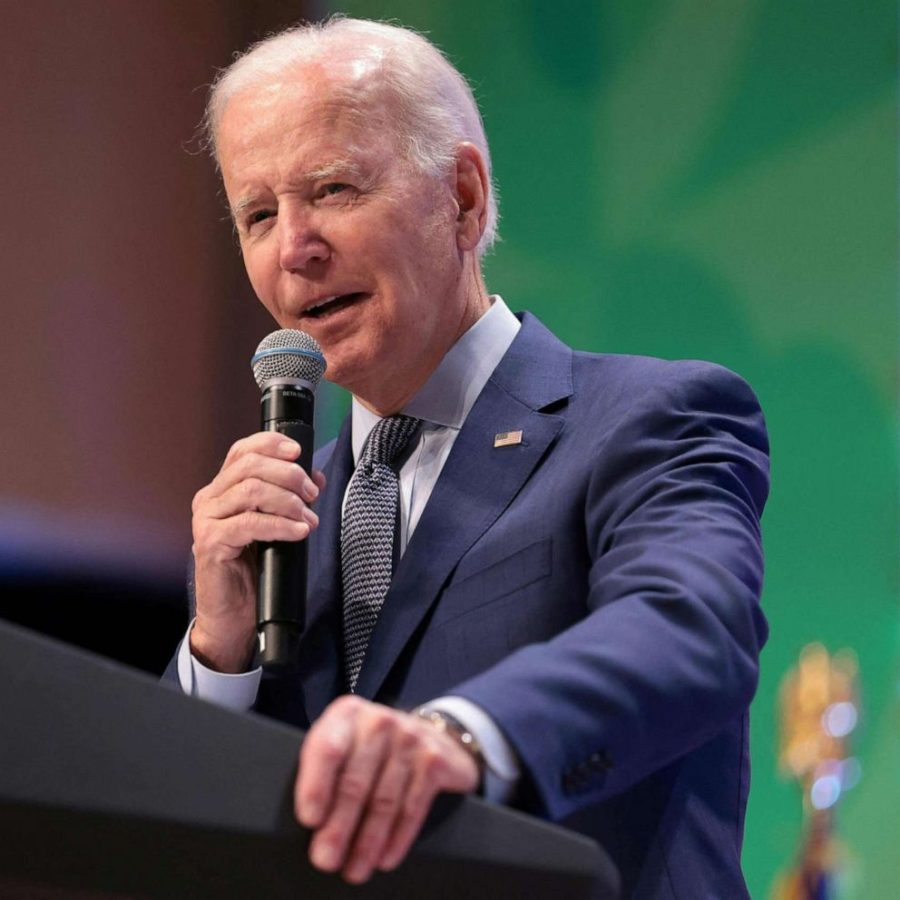Biden’s pardon shows promise
Joe Biden, who recently pardoned those convicted of federal marijuana offenses, speaks at a White House conference.
November 2, 2022
On Thursday, Oct. 6, President Joe Biden pardoned over 6,500 people who were convicted under federal law of simple possession of cannabis since the 1970s. Though this is a major step in the legalization of cannabis, the majority of those convicted of simple possession fall under state law. Therefore, it’s ultimately up to governors and state legislatures to follow suit, a step the president is urging them to take.
Biden’s pardon — coming right before midterm elections — has pushed the ongoing debate about cannabis to the forefront of national and state politics. Democrats hope the push to legalize and decriminalize cannabis will energize younger, college-age voters in swing states like North Carolina, which also has stricter cannabis laws.
N.C. Governor Roy Cooper is in favor of following Biden’s policy and decriminalizing simple possession in North Carolina and ending the stigma.
“Conviction of simple possession can mar people’s records for life and maybe even prevent them from getting a job,” Cooper said on Friday, Oct. 7.
On Wake Forest’s campus, almost half of the student population has reported smoking cannabis before, and 26.5% of Wake Forest students report smoking on a regular basis, according to the Spring 2020 National Collegiate Health Assessment, as well as the Spring 2021 WFU Social Norms Survey.
Under North Carolina state law, almost half of Wake Forest students should have a criminal record.
Although this issue affects all Americans, African Americans are 3.64 times more likely to be arrested for cannabis possession, according to the American Civil Liberties Union (ACLU). Even in states that have decriminalized cannabis, this racial disparity still exists as far as arrests go.
66% of Wake Forest students are white, while only 8% are black. Although our student population is geographically diverse and therefore brings a mix of cultural and social views on cannabis, we are not a racially diverse school.
Statistically, most of our students are not at a higher risk of being charged for possession of cannabis based on race, giving our campus a skewed perspective on the root of America’s cannabis crisis.
In North Carolina, possession of more than 0.5 ounces of cannabis is punishable by up to 45 days in jail and up to $1,000 in fines, without exemptions for medical use. Possession of more than 1.5 ounces is classified as a felony.
“It’s a step in the right direction in the war against unjust drug charges,” sophomore Julian Gideon said. “Politicians should be making decisions that benefit their constituents, and legalizing weed is what many Biden voters want.”
Gideon, who is a Maine native, noted that legalizing weed is an issue that could inspire him to change his voter registration from Maine to North Carolina to help swing the state blue in future elections.
“Biden is making the right decision about pardoning weed charges because it seems silly having some Americans, mostly minorities, being locked away behind bars while in other parts of the country, you can walk down the street smoking a joint freely,” Winston-Salem resident and sophomore Logan Brown said.
“Although I’m in favor of legalizing weed, I think Biden’s move was purely a political showing scheduled strategically right before midterms as a last-ditch effort to get more voters,” sophomore Abby Stubelis said, taking an alternative view, “If the pardon only actually helps a very small portion of those convicted under federal and not state law, then it’s kind of unfair to pretend it’s going to actually help a huge group of people.”
Biden’s pardon has — at the very least — started the conversation about the ethics behind drug laws in the United States. His policies affect communities and campuses nationwide, as many draft their laws based on federal policy. Democrats and Republicans alike will have to wait to see how this policy affects voter turnout for the approaching midterms.
Legalizing weed should not be a controversial issue, or really an issue at all. The science and evidence support its benefits. Our world is succumbing to climate change, children are in cages and nationalism is on the rise globally. Our time is better spent focusing on legitimate issues rather than whether people want to smoke a joint.















